- Home
- Gavin Chappell
The Londinium File Page 12
The Londinium File Read online
Page 12
‘Is this true?’ asked Sabina icily.
‘It’s a pack of lies,’ said Flaminius. ‘Would you believe a man who I have seen spying on your every move?’
‘Nobody is spying on you, my lady,’ said the imperial agent. ‘Don’t listen to the words of a thief and a liar.’
Sabina laughed. ‘Now I know that it is you who is the liar,’ she said; ‘condemned out of your own mouth! I have been spied upon every night that I have been imprisoned here. I have heard your whispers and your scurryings. Like rats! You have infested this place like vermin! I would have reported you and your kind long ago, but I knew that my husband employed you. He spies on everyone! You can’t fool me, oh,’ she added with a laugh, ‘but I fooled you. As soon as you thought I was asleep…’
The agent looked stricken at her revelations. It was inconceivable that the object of his surveillance could have been aware of him.
Unsheathing his stolen sword, Flaminius moved like a striking snake.
The agent turned quickly, bringing up his already drawn weapon, and the clash of the two blades rang out from the frescoed walls. Flaminius cursed. He had to despatch this spy quickly. The noise of fighting would bring the guards. And he knew of only one escape route—the way they would come.
The agent’s scar flushed redly, and he snarled. ‘You will surrender yourself to me at once,’ he blustered. ‘My orders were to wait for you and to make you my prisoner.’
Flaminius lunged at him again but the agent brought down his blade in a ringing parry. ‘Is that why you killed that slave?’ Flaminius panted. ‘Minos, the library slave?’
The agent tried to dash the short sword from Flaminius’ hand, but Flaminius leapt back, colliding with the couch where Sabina sat in terror, arms wrapped around herself. Flaminius barged forwards, knocking the agent back. He followed up with another lunge, but the agent dodged backwards, then flexed his arms.
From outside came shouts and the clatter of running feet. The agent jerked his head in their direction. ‘You’re outnumbered, thief,’ he said. ‘In moments I will be surrounded by Praetorians. They have no notion what is happening here, but they will not let you leave alive.’
Flaminius met him in the middle of the floor, by the table where the amphora stood. Their blades rang again, but as they did so, Flaminius kicked out and sent the table flying. The amphora hit the ground with a sharp crack and wine spilled like blood on the coloured tiles. The agent slipped in the spilled fluid and as he fell on his back his blade went skittering across the wet floor.
Flaminius grinned with cold satisfaction, standing over the man with his sword pointing at his chest.
‘Now,’ he said, ‘maybe you can answer a few questions. Who are you? And who are you working for…?’
As if in horror, the agent put his hand to his mouth. Flaminius saw the man’s throat working. Dropping his sword with a sharp clang, he seized the man’s wrist and pulled his hand away. The man choked. He writhed on the floor. His heels drummed the tiles. He stilled into immobility, mouth white with froth.
Sabina shrieked.
‘Poison,’ Flaminius muttered. ‘He must have had a poison pill in his hand. Now I’ll never know who he was.’
He rolled the agent over hurriedly, checking his body. It came as no surprise that the man was dead. But that wasn’t what concerned him the most as he searched through his tunic.
‘What are you looking for?’ It was Sabina’s shaking voice. ‘Are you a thief, as he said? Would you steal from the very dead?’
Flaminius ignored her. He gave a sigh of satisfaction as his questing fingers found a scroll thrust into the man’s tunic. Drawing it out, he unrolled it enough to read the first words.
At the sound of shouted orders from outside he glanced up. Turning to Sabina, he said, ‘I’ve found what I was looking for. Whatever he may have said, I’m not a thief. I’m not a treasure hunter. There is a conspiracy at the heart of Roman politics, and I am attempting to expose it. This memorandum may very well help me. But not if I’m found here. Is there another way out of your quarters?’
She shook her head. Flaminius thrust the document inside his own tunic and crossed the room to seize her by the arms. ‘Is there no way I can escape? Think, woman! Think!’
There was a clatter from outside. The Praetorians were already in the passage.
— 15—
‘My bedchamber!’ she gasped.
Flaminius was taken aback. ‘This is hardly the time…’ he began.
Impatiently she grabbed his wrist and led him into another room, lamp held high in her other hand. In one corner was a bed surrounded by drapes. The walls were festooned with hangings. Running to the far wall she indicated a dark line of shadow near floor level.
Flaminius realised where he was. This was indeed her bedchamber, and he had seen it before—from the other end of that dark slit in the wall. It was barely wide enough to let a rat enter the room.
‘Why are you showing me this?’
Someone began pounding on the main doors outside.
‘I-I thought you could get out that way,’ she stammered.
‘Through here?’
She grew angry. ‘There’s no other option,’ she told him. ‘If there was a better way out, don’t you think I would have taken it long ago?’
Flaminius knelt down to examine this supposed exit. He would hardly have noticed it if she hadn’t drawn his attention to it. She seized his wrists and looked him in the eyes.
‘You said you had come here to rescue me,’ she panted. ‘But the man with the scar, he said… and then you said… Who in Juno’s name are you? Will you rescue me one day? I would be happy if only I could have my liberty restored.’
There was a splintering crack from the main doors as the guards forced them open. Needlessly, he thought, since no one had locked them, but the Praetorians weren’t to know. He snatched his hands free from her surprisingly strong grasp.
‘I’ll see what I can do to make sure you are set free,’ he said, ‘if I can.’
He thrust his legs into the crack. To his surprise it was wider than he’d expected, and they dangled down at an angle. He slid himself in as far as his waist, then the sword belt got in the way. Hastily he removed it and with a scraping clatter slid sword and sword belt down the shaft. Looking up, he said, ‘Get into bed. Tell them you heard fighting but don’t know who it was.’
She seized his chin in her small hands and kissed him.
Flaminius broke off as he heard a Praetorian shouting, ‘There’s another body here, sir!’ and another saying, ‘Search the apartments. Where is our guest?’
As Flaminius slid down the shaft, the last thing he saw was Sabina blowing out the lantern as she scrambled back into bed. He half slipped, half lowered himself down the shaft. It was tight, not meant for a man’s passage, and several times he thought he would remain stuck in there until he died. But as he felt his legs come out into the cold void of the tunnel below, he heard more voices.
‘We’ve found her, sir.’
‘My lady, there is a corpse in the main room. Can you explain its presence?’
‘We heard a scream, and the sound of fighting. Have you been troubled by a fugitive?’
Her answer was muffled, confused. She was a fine actress, Flaminius thought. As good as Rhoda.
With a thump Flaminius dropped down onto the tunnel floor. It was pitch black except for the wavering line of torchlight from the slit. He felt about on the cold stone floor until he found the hilt of his short sword. As the muffled conversation continued above, he strapped on the sword and marched off down the tunnel in the direction of the Pavilion of Tempe.
With luck, Rhoda would still be waiting there and they would be able to escape the Villa together. If she had gone wandering, he had no intention of searching for her in a place that rivalled a kicked-over anthill for confusion and chaos.
He stumbled onwards through the all-encompassing darkness, able to make his way only by feel. It was colder
than Caledonia in winter down here, darker than an Egyptian tomb. At one point his groping hands met the rungs of the stone ladder that would take him up to the little room off the Golden Square, but he felt that it would be a bad idea to climb it.
With luck, Sabina had sent the Praetorians off in the wrong direction, but for all he knew he would find them waiting for him up there. He regretted deceiving her, but he had had no real choice. And perhaps a flying visit from a stalwart young renegade had added spice to her dreary imprisonment.
Finally he came to the end of the tunnel, where stone rungs led him up another shaft that opened in the Pavilion of Tempe. He lifted the trapdoor cautiously and looked out. No sign of anyone; no Praetorians, no Rhoda.
He climbed out and carefully closed the trapdoor behind him. Hand on the pommel of his sword, he went to the cubbyhole under the flight of steps.
‘Rhoda?’ he hissed. No reply. ‘Rhoda!’
He entered the cubbyhole to find it deserted. She had gone.
He hurried back out into the passage. Somewhere in the direction of the Golden Square he could hear the Praetorians still searching the grounds. Had they captured Rhoda? Why had the silly girl left her hiding place? Surely she could have seen it was dangerous.
Now Flaminius would have to escape on his own. Well, one man might evade the searching Praetorians better than a man and a girl. He hurried through the deserted passages of the pavilion and came out on the far side.
A grass lawn stretched away into the darkness. He could see no sign of the perimeter wall, but a whisper of smoke still hung in the air, so the wood stack Rhoda had fired the night before must have been close. He must reach the wall, climb it, make his way through the woods and fields back to the road—and Rhoda’s carriage would be there to take him away. The slave might make a fuss if Rhoda was not with him, but he had a sword.
What if the carriage was not there? What if Rhoda had abandoned him? It would be a long walk, and he might well have Praetorians on his tail. He needed a fast getaway.
Well, he wouldn’t get away by dithering. He left the doorway at a run. He was only halfway across the lawn when he heard a shout from behind him.
Looking back over his shoulder, he saw several torch bearing guards standing beside the palace. One was pointing at him. Even as he looked back, they began to sprint after him.
He ran through the dark. He had one advantage over his pursuers: they were weighed down by armour, crested helmets and burnished breastplates. All he had to slow him was the short sword at his hip. As he ran, he debated unbuckling the sword belt and flinging it away, the sword with it. But he decided against it. If the Praetorians caught up with him, he would rather go down fighting than face the interrogators.
He kept running. The wall loomed up in the darkness.
Flaminius flung himself up, swarming over the top. As he did, the air whistled around him and a spear passed by, followed by another, both plummeting into the darkness of the wood beyond. He glanced back to see the Praetorians had been reinforced. They seemed to be using him for target practice. Something thumped against his shoulder, and he looked down in wonder to see that a spear had struck him a glancing blow before falling to the grass.
As more spears whistled his way, he half jumped, half fell over the other side, landing heavily and awkwardly in the undergrowth. Peering dazedly out between broken branches, he heard the Praetorians advancing towards the wall.
‘Did you kill him, Ennius?’ one shouted.
Another Praetorian shook his head. ‘Just winged him, I think. He must be down there.’
Flaminius clutched at his shoulder, felt his palm sticky with his own blood. Ignoring the pain, he rose up on hands and feet and crawled deeper into the undergrowth. As he did, he heard the voices of the Praetorians, and mingled with them came the deep barks of dogs.
Somewhere deeper in the wood, he stepped out onto a narrow path. He had to find his way to the road and the carriage. That was his only chance of escape. The Praetorians were now quartering the wood, torches held high, ruddy lights shining in the darkness like the Pharos of Alexandria. He turned and hurried away.
He came out on the edge of a field. Away from the lights of the Villa, he could see the stars shining down, pale and cold. The field was washed by their dim glow. And on the far side marched a line of trees. He remembered them running alongside the Tiburtine Way. He had almost made it, he realised. All he had to do was cross the field and he would be at the carriage. He started to run.
Almost at once, he heard men shouting behind him. He looked back to see torch bearing Praetorians at the edge of the woods. Some of them had hunting dogs straining at the leash. They started to follow him, the dogs barking, the guards yelling.
Panting, he ran on.
Rhoda sat in the carriage, peering out of the open door, her slave up on the footboard silently awaiting the order to leave, the four horses snorting impatiently. She could not return to Probus with a story of a failed mission. She had never failed a mission for him yet, and he paid well. He was her best client. But he had never previously insisted she take on a novice in the art like that dolt Flaminius. The fool botched all their chances when he broke that Praetorian’s neck. They could have hidden. They could have run. By killing the man, he had inevitably alerted the rest. And now see what that had led to!
Since she reached her carriage the Villa had been a hubbub, a chaos, a confusion of light and noise. She pictured Flaminius running for his life, guards at his heels. The noise surely meant that he still lived. She was for once in her short life paralysed by indecision. Now she did not know whether to tell the slave to whip up the horses and head for Rome and Probus, or to wait to see if by the most incredible of chances Flaminius might get back to them alive. But how could he do that if he was pursued?
Torches were flaring among the trees by the road. The search had fanned out this far. But where was the hunted fugitive? She shook her head. She had made her decision.
‘Even if Flaminius still lives, he will only bring the Praetorians down on us,’ she declared. ‘Whip up the horses, Cingetorix. We must leave.’
A figure hurtled out of the gloom, racing across the field. And behind it came torch bearing figures and barking dogs.
Cingetorix cracked his whip.
‘Stop, you fool,’ Rhoda said as the horses broke into a trot. ‘Whoa there!’
Cingetorix pulled at the traces and the horses came to a halt again, snorting and whinnying. Flaminius tumbled out onto the road, and Rhoda cried out to him.
‘Over here!’
Flaminius ran for the still open door of the carriage. Praetorians appeared, swords drawn. Flaminius leapt into the carriage, pushing past Rhoda. Cingetorix cracked his whip again. The carriage door slammed shut of its own accord as the vehicle took off down the paved road, but a flung spear struck it and stood shaking in the wood as the horses galloped away into the night.
Flaminius sank back against the carriage wall. He was panting, and sweat stood out on his skin, but he was grinning.
‘Well timed,’ he gasped. ‘I thought you were going without me.’
He peered back up the road. The Praetorians were rapidly receding dots of torchlight in the darkness beneath the stars. He turned to Rhoda again. She was watching him.
‘What an unholy mess you made of the whole business,’ she said. ‘We were both almost killed. And for what? Did you even make the rendezvous with the slave Minos?’
Flaminius shook his head. ‘When I found him, he was already dead,’ he began.
Rhoda snorted. ‘I knew you would botch the whole business…’
Flaminius felt inside his tunic. ‘Luckily, however,’ he said, ‘I caught up with the man who killed him.’ He produced the scroll and brandished it triumphantly. ‘This is what we came for.’
They were thundering down the road, skirting the Villa. Flaminius saw the turnoff for the drive up ahead. And as they raced past, he heard the pounding of many hoofs.
‘What’s
that?’ cried Rhoda.
Flaminius looked back and went pale. A troop of horsemen was galloping out of the drive and onto the road behind them.
‘Imperial horse guards,’ he said. ‘They’re right behind us.’
— 16—
The decurion in command of the troop of cavalry was a barbarian, an Angrivarii warrior who had joined the Roman auxiliaries in Moguntiacum and worked up the ranks until he received this posting—guarding the emperor’s wife. Gaiseric was his name, and he was a fiercely loyal supporter of the emperor.
He dug his heels into his horse’s flank and galloped onwards down the starlit road, followed by the steeds of his sworn comrades, each a man of Germanic stock like himself, each red bearded and long haired, each clad in mail and carrying a long lance. The trees on either side of the road echoed back the clamour of their passing, dust rose in the gloom, half choking the helmeted riders. Far off, their quarry was still careering wildly down the road.
They broke out from the trees. The carriage was halfway across the bridge over the River Anio. Gaiseric drew his long sword and shouted harshly in his own tongue, ‘After them! Don’t let them get away!’
The bridge boomed to the drumming of the horses’ hoofs as they crossed it. Still the carriage hurtled down the road, which was now a silver strip leading between the blackness of fields and vineyards. But they were gaining on it. Gaiseric felt a fierce exultation grip his heart, and he vowed rich sacrifices to the god Tuisto if he was the one to reach it first.
The horses, urged on by their riders, galloped faster. At last Gaiseric was right behind the runaway carriage, which was lurching about the road, dragged by the four maddened horses, seemingly out of control. Gaiseric urged his own steed closer… closer… closer.
Now he was neck and neck with the first of the horses, a slender bay. He craned his head round to glare at the footboard, seeking to speak to the driver. But there was no driver! Where in most carriages a slave would sit, whip in one hand, traces in the other, was—emptiness. Blankness. Gaiseric felt a thrill of superstitious fear. Was this some ghost carriage driven by invisible phantoms?

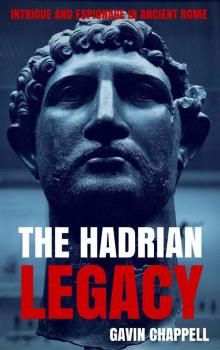 The Hadrian Legacy
The Hadrian Legacy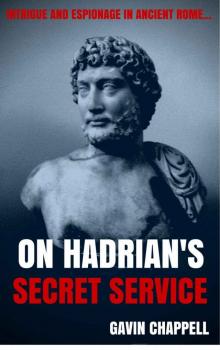 On Hadrian's Secret Service
On Hadrian's Secret Service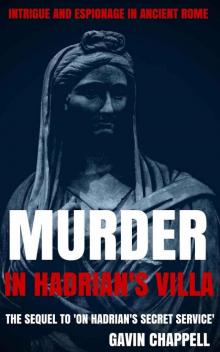 Murder in Hadrian's Villa
Murder in Hadrian's Villa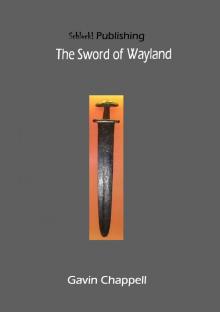 The Sword of Wayland
The Sword of Wayland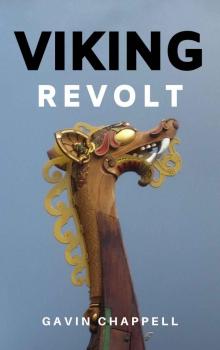 Viking Revolt
Viking Revolt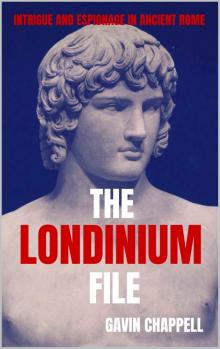 The Londinium File
The Londinium File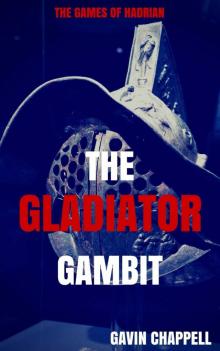 The Gladiator Gambit
The Gladiator Gambit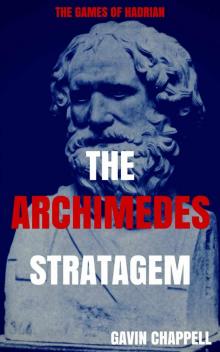 The Archimedes Stratagem
The Archimedes Stratagem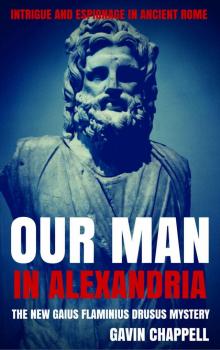 Our Man in Alexandria
Our Man in Alexandria Into the Void (The Dungeoneers)
Into the Void (The Dungeoneers)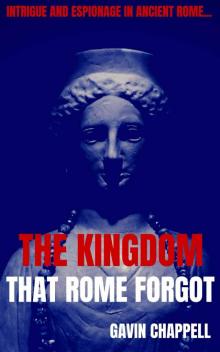 The Kingdom That Rome Forgot
The Kingdom That Rome Forgot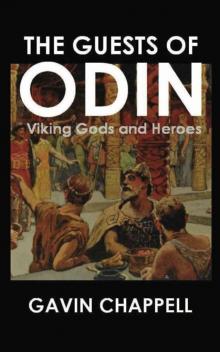 The Guests of Odin
The Guests of Odin